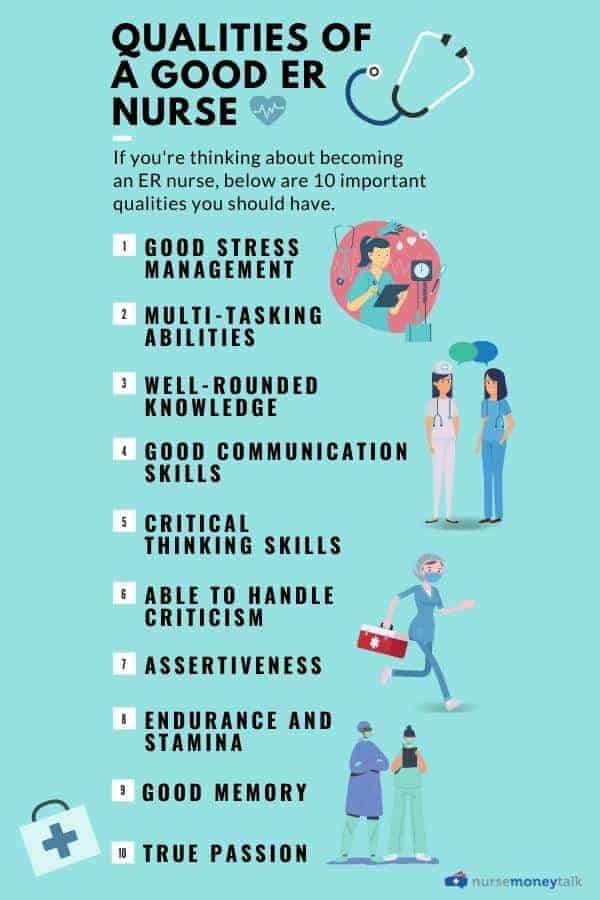Being an ER nurse is perhaps one of the best nursing specialties out there.
Although it’s not an easy job, it’s an incredibly rewarding career.
If you’re thinking about becoming an ER nurse, below are 10 important qualities of a good ER nurse.
*Disclosure: This article on qualities of a good er nurse may contain affiliate links. If you click and make a purchase, I may receive a commission. For more info, please see my disclaimer.
Essential Qualities of a Good ER Nurse

1. Good Stress Management
Studies have shown that at least 65% of emergency nursing staff suffered from moderate levels of stress, and over 20% of them suffered from severe levels of stress.
Why such high amounts?
Emergency room nurses are at the front lines of a patient’s road to recovery. ER nurses are there when patients are at their worst, whether from a medical condition or a traumatic injury.
It’s the job of ER nurses and medical providers to stabilize a patient and save their lives in the ER setting.
As an ER nurse, it’s vital to handle the stress that comes with dealing with the worst-case scenarios.
By keeping a calm attitude, a level head, and knowing how to calm yourself and handle emergency situations, you’ll be better prepared for working in an emergency room setting.
2. Multitasking Abilities

Depending on the size of your hospital, ERs can have 1 to 3 patients (or more) per hour walking through their doors.
This is a large number considering all these patients will need proper care and treatment.
As an ER nurse, you must know how to multitask between patients.
Although triaging can help during the initial assessment, you should work on skills to improve your ability to multitask, such as:
- Working quickly
- Setting goals
- Giving yourself a timeline
- Avoiding distractions
3. Well-Rounded Knowledge
As an ER nurse, you’ll need to have knowledge in virtually every area of medicine.
Patients will visit the ER for just about any reason, from trauma, broken bones, internal injuries, to childbirth, and more.
Research as much as you can on different topics. Write down notes and review them later when you are exposed to a new medical case, and continue to be enrolled in continuing education courses for nursing.
These can all help you know how to treat a variety of patients in the ER.
4. Communication Skills

From listening to your patient’s concerns, to properly charting their condition and sharing that information with the on-call provider, these are all essential skills to have as an ER nurse.
You’ll want to make sure you’re doing everything possible to communicate effectively with your patient and their families.
If there is a language barrier, always ask for help in translating.
For agitated, angry, or aggressive patients, keep a calm attitude and try and communicate as best you can.
The ER will have many patients who will all have their own communication style you must work with.
Related: 10 Best Languages For Nurses to Learn
5. Critical Thinking Skills
In the ER, anything can happen. Your patients can go from being stable to being in critical condition.
It’s important to utilize critical thinking skills to help you make an informed decision on your patient’s care.
Critical thinking skills can help you, and your healthcare provider team make an accurate diagnosis.
Related: 5 Important Emergency Nursing Skills
6. Able to Handle Criticism
As a nurse, making mistakes is a matter of if, not when.
As soon as you make a mistake, you’ll want to reach out to your immediate supervisor to let them know.
Whether that was mixing up medications, not giving the right amount, or even charting errors, these are all critical errors that can put a patient’s safety at risk.
If you choose to work as an ER nurse, you must be willing to report your mistakes and learn from them.
If your team gives you advice on how to improve your nursing skills, remember that learning to become the best nurse is a lifelong journey.
Be open to criticism so you can improve your patient care.
7. Assertiveness
Did you know that 1 in every 8 hospital room visits was due to a mental illness or substance abuse disorder?
Many of these visits deal with patients having suicidal ideation. Other times, patients might visit an emergency room to be evaluated due to aggressive behavior, psychosis, and other illnesses that can put your safety at risk.
Whether dealing with difficult patients, patients with agitation, or agitated family members, you’ll need to be assertive and have a command presence to provide care and ensure your safety.
An assertive nurse will be able to calm a situation, de-escalate patients, and even lead their team in the ER.
8. Endurance and Stamina

Working in an ER takes physical endurance and stamina.
You’ll have to stand on your feet for 12 hours a day or more, provide care to multiple patients on your floor, and run (literally) to codes or other hospital incidents.
In addition, ER nurses are also expected to lift patients and help transport them.
As an ER nurse, make sure you have comfortable shoes and clothing and don’t mind the physical portion of nursing.
It is well worth it to be a part of the excitement and save lives.
9. Good Memory
Whether it’s remembering what patient ordered for food, their names, or important information to pass down to incoming shifts, it’s vital to have a good memory as an ER nurse.
Fortunately, this skill has many workarounds, such as keeping a notepad handy (making sure not to write down patient identifiers) or asking other staff for help.
You can also do activities to help boost your memory and prevent memory loss, such as exercise and socializing regularly!
Related: 10 Must-Know Tips For New ER Nurses
10. True Passion
As an ER nurse, no day is ever easy. Some days will be filled with trauma, sadness, frustration, and fatigue.
However, if you have a true passion and are willing to face anything the ER throws at you, there’s no other job quite like being an ER nurse.
Find your passion and motivation so you can continue to provide high-quality patient care.
If you feel you’re becoming jaded or are having second thoughts, it’s best to get professional help through a counselor to help you re-evaluate your career choice.
Finding a Therapist
If you need to talk to a professional, check out this platform for finding licensed therapists.
Find Your Calling As An ER Nurse
Emergency room nurses are the backbone of any hospital.
If you want to work in this field, you must be physically and mentally tough.
You must also have a true passion for your career and be dedicated to helping your patients live healthy lives!
If you’re ready to become an ER nurse, or you want to find other areas of nursing to work in, check out our job and school board!
Have You Read These Yet?
- ICU Nurse vs ER Nurse
- Examples of ER Nursing Interview Questions and Answers
- Can a New Nurse Work in the ER?
- ER Nurse vs OR Nurse: Which Career Should You Choose?
- 5 Pros and Cons of ER Nursing

